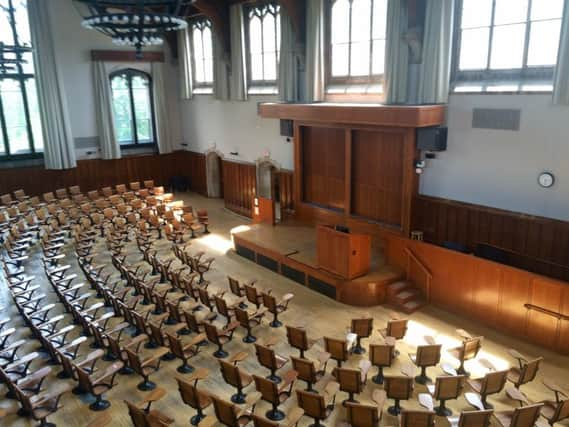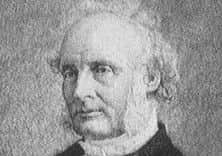James McCosh, Ulster-Scot who laid the foundations for world-class Princeton University


James McCosh was a major figure in the religious and intellectual history of Scotland, mid-19th century Ulster and the late-19th century United States.
In Ulster he was Professor of Logic and Metaphysics in Queen’s College, Belfast, an outstanding educationalist and opinion former. As the 11th president of Princeton, he led the college with great skill, transforming it and preparing it for university status. He represented the last great flowering of the Scottish Enlightenment. If Francis Hutcheson – usually regarded as ‘the Father of the Scottish Enlightenment’ – was the intellectual embodiment of the ‘constant factor’ between Ulster and Scotland, McCosh was emblematic of the wider Ulster-Scots epic linking Scotland, Ulster and America.
Advertisement
Hide AdAdvertisement
Hide AdJames McCosh was born in 1811 into an Ayrshire family of Covenanting stock. He was educated at the universities of Glasgow and Edinburgh. Although he spent less time studying in Edinburgh, it was from Edinburgh rather than Glasgow that he graduated.


McCosh entered the church in 1834, becoming a Church of Scotland minister in the east of Scotland, first at Arbroath and then at Brechin.
In 1843 there was a schism over the question of lay patronage within the Church of Scotland. Described as ‘the Disruption’, 474 ministers (out of a total of 1,200) led by Dr Thomas Chalmers left the church to form the Free Church of Scotland.
McCosh sided with the Free Church, becoming the minister of the new East Free Church in Brechin. He was nationally prominent in the Free Church and very successful locally in building up his new congregation.
Advertisement
Hide AdAdvertisement
Hide AdIn 1850 he was appointed Professor of Logic and Metaphysics at the new Queen’s College, Belfast (now QUB), a position he owed in large measure to the impact of his first book, ‘The Method of the Divine Government’, published in Edinburgh in 1850.
McCosh spent 16 years in Belfast where he wrote a series of books, most notably ‘The Intuitions of the Mind’ in 1860, a defence of the ‘Common Sense’ philosophy of the Scottish school of Thomas Reid and Dugald Stewart. These books gave him a transatlantic reputation. Professor David N Livingstone explores McCosh’s years in Belfast in an essay in ‘Queen’s Thinkers: Essays on the intellectual heritage of a university’, edited by Livingstone and Alvin Jackson. The book was published in 2008 to commemorate the centenary of the granting of QUB’s charter in 1908.
In 1868 James McCosh was offered and accepted the presidency of the College of New Jersey in the United States of America (now Princeton University).
In the years during and after the Civil War the institution had been in the doldrums but over the next two decades McCosh raised the prestige of the institution by recruiting distinguished scholars, overhauling the curriculum (not least by expanding the place of the sciences), and instigating graduate research. He also embarked upon a major building programme on the campus.
Advertisement
Hide AdAdvertisement
Hide AdNot being content with being an administrator, McCosh continued to write and teach.
McCosh’s own most original work concerned the attempt to reconcile evolution and Christian beliefs. He was probably the first religious leader in north America to view Darwinism sympathetically. He did not equate Darwinism with atheism but argued that evolution, far from being inconsistent with belief in divine design, glorifies the divine designer. This aspect of his work found popularity among Presbyterian and evangelical clergy, who found his arguments useful in their attempts to cope with scientific philosophy.
McCosh had very fixed views about the ideal college curriculum. In his inaugural lecture at Princeton he warned of the dangers of excessive specialisation.
‘Let the student first be taken, as it were, to an eminence, whence he may behold the whole country . . . and then be encouraged to dive down into some special place, seen and selected from the height, that he may linger in it, and explore it minutely and thoroughly.’
Advertisement
Hide AdAdvertisement
Hide AdIn 1885 McCosh and Charles W Eliot, the president of Harvard, engaged in debate about what the ideal college curriculum should look like.
McCosh was extremely critical of the regime at Harvard where students could choose, pretty much as they pleased, among some 200 courses. This, he contended, encouraged dilettantism. Furthermore, Harvard students were not obliged to attend classes, with the result that professors often found themselves lecturing to a roomful of empty seats.
At Princeton, regular attendance was required of students, and the whole curriculum had been carefully weighed and logically worked out for all four years, including obligatory core courses and a reasonable variety of solid electives, so that one subject led to another, and the student could develop his powers in an orderly fashion.
At the time Princeton loyally believed that McCosh had won the argument. He may have won the battle but surely lost the war.
Advertisement
Hide AdAdvertisement
Hide AdMcCosh retired in 1888 and was succeeded by Francis L Patton as the 12th president of Princeton.
McCosh had been idolised by his students, to whom he was ‘Old Jimmie’. He was deeply touched when the Class of 1889 unanimously requested that their diplomas should carry his signature alongside Patton’s. The response of an emotional Isabella McCosh, the niece of Thomas Guthrie, another key figure in the Disruption of 1843, was to tell her husband, ‘James, your lads are nae for forgettin’ you’.
Like his wife, McCosh retained his Scots mode of speech. On campus, when passing students acknowledged him with a bow, his response was almost invariably the same: ‘I know ye, whooo air ye, whatsyourname?’. And the students, having identified themselves and listened to a few ‘wurruds’ of greeting, commonly went away exalted. For most of them knew and believed the old man’s hearty boast, ‘It’s me collidge. I made it’.
It was always ‘me collidge’ rather than ‘my college’. The fact that Princeton is one of the top 10 universities in the world and one of the world’s foremost research universities with connections to more than 40 Nobel laureates may be construed as evidence of the solidity and the excellence of the foundation McCosh laid.